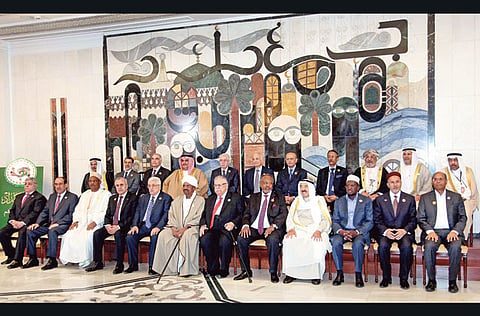Rediscovering Arab identity
Regional parties must realise that politics is about working with people, not manipulating them

The present political turmoil in the region is sending shock-waves throughout the Arab world given its strategic importance in international politics.
The region's importance stems primarily from the fact that it has an abundance of the most important natural resource — oil — on which industrialised countries and others depend. This, despite talk of the existence of oil in the Arctic region, which remains a top secret topic.
No wonder that smuggling of black gold has become a phenomenon that has outpaced drug and human trafficking as one of world's most profitable illegal enterprises, which in turn has led to the emergence of a nouveau riche class in the Arab social structure.
This happens at a time when ordinary people in many Arab countries are still marginalised and denied their rights to life and dignity, not to mention their basic requirements. Hence, they struggle to survive, at the expense of their dignity and honour.
In fact, the calls for change, despite the use of grand slogans and attempts to play on one's emotions, lack reason and common sense. But they constitute the political position of most parties that call for liberation and the breaking of barriers.
This has led to the emergence of racial, sectarian, religious and ethnic groups in the Arab nation. But, it seems that destructive and dark forces have been in a latent state, waiting for a suitable opportunity to strike and divide the Arabs. Throughout the decades, Arabs have resisted many plots. Neither the regimes' prisons nor international laws were able to make freedom seekers and political activists give up their just cause.
The Arab world has always been a target for forces of destruction through the implementation of dubious designs or through malicious media campaigns.
The media campaign against the current development in the GCC countries stands as an example of destructive designs and plots against the Arabs. As a result, unemployment rates have increased despite the scarcity of Gulf citizens in different areas of work, whether in the public or private sectors.
Also, Islamist political parties have attracted and recruited women in countries with high population density, with the aim of convincing Arab women in these countries that they need to get back to the kitchen and stay at home. But women have resisted such attempts by insisting on their right to work while preserving family integrity. This clearly means that no one can stand in the way of a person who has a firm and strong will and determination to do what he or she believes in.
Amid these political tensions, Baghdad hosted the Arab summit last month, which managed to bring Iraq back to its Arab roots. An Arab is a person who belongs to the Arab-Islamic culture, an identity that does not stem from ethnicity but is determined by loyalty and belonging to this rich culture.
This is simply because ancient civilisations were unable to rock the pillars of the Arab nation. This nation is still striving to fulfil the dreams of its people for freedom and justice, food and jobs, despite all the circumstances and obstacles.
Prosperity
We realise that most great scientists, artists and literary figures who enriched the Arab civilisation and raised the banners of its progress and prosperity during the Arab Islamic renaissance were not actually Arabs but were deeply interested in the Arab-Islamic culture.
The US provides a good example of how a country made up of people from a wide variety of ethnic, cultural and religious backgrounds succeeded in building a strong nation — one country under one flag and with one national anthem.
The US has become the world's strongest and richest country in terms of its human and financial assets despite the problems of racial discrimination, and managed to emerge from the civil war with lessons that helped ensure future prosperity.
For us Egypt will remain the mother of the Arabs, while Syria is home to all Arabs, and the Gulf region will always welcome Arabs and others.
People who will survive will be those who recognise the importance of cohesion on the domestic front, under the banner of one nation and the supremacy of freedom and social, political and economic equality in every sense of the words.
The talk about returning to ethnic or racial backgrounds provides evidence of the deep crisis with people who think their race is superior to all other races, and have not learnt from what happened to Nazi Germany under the reign of Adolf Hitler.
All political parties in the Arab world must realise that politics is the art of the possible, not the art of manipulation, and hence they should acknowledge that the people are now more aware of their rights and duties.
But have they realised that, in order to take the first step in the right direction?
Dr Mohammad Abdullah Al Mutawa is a professor of sociology.
Sign up for the Daily Briefing
Get the latest news and updates straight to your inbox


